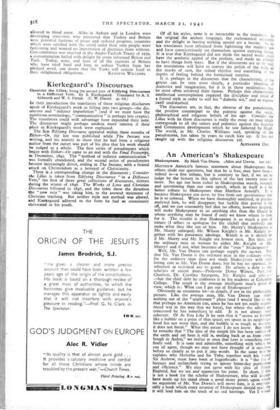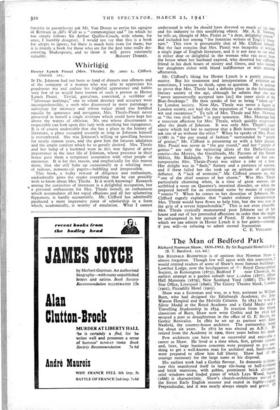An American's Shakespeare
Shakespeare. By Mark Van Doren. Wien and Unwin. 12s. 6d.)
MATTHEW ARNOLD'S famous statement about Shakespeare that others abide our questions, but that he is free, may have been— indeed is—a fine tribute, but, is contrary to fact, if, we are to judge by the history in this sphere of the last twenty years or more. No age has been richer in Shakesperian search, research and questioning than our own epoch, which in itself is a far better tribute to Shakespeare than Matthew Arnold's. It is because Shakespeare can never be free from our questionings that he is so colossal. When we have thoroughly analysed, or psycho- analysed him, he will disappear; but luckily that period is far off, and we can reasonably feel that no efforts, however inspired, will make Shakespeare to us anything else than the Oracle in whom anything may be found if only we know where to look for it. The trouble is that Shakespeare is so much a part of nature (I refuse to apologise for the cliché) that anybody can make what they like out of him. Mr. Murry's Shakespeare is Mr. Murry enlarged; Mr. Wilson Knight's is Mr. Knight to- gether with his passionate ideology. Which is as it should be if Mr. Murry and Mr. Knight are honest men. But then. can the ordinary man or woman be either Mr. Knight or Mr. Murry? and if not, what becomes of the " true " Shakespeare? Well, Mr. Van Doren can perhaps supply the an&wer. Not that Mr. Van Doren is the ordinary man in the ordinary sense, for the ordinary man does not study Shakespeare with such loving care as Mr. Van Doren does; but. he has no spiritual, sa- tellectual or technical axe to grind_ He admits a debt to the schears of recent years—Professor Dover Wilson, Prof:aor Charlton, Dr. Caroline Spurgeon, Mr. Knight and othea- -but the chief debt he confesses is to his students at Columbia College. The result is the average intelligent man's point of view, which is : What can I get out of Shakespeare? Obviously an enormous Iot—in details, if not in the philosophic picture. Like the average man, Mr. Van Doren. can make nothing out of the " unpleasant plays (and I would like to saY that perhaps no American can, since he has not yet. really experi- enced war in the way that we have), but where the others arc concerned he has something to add. It is not always very coherent. Of As- You Like It he says that it " seems to balance like a bubble on a point of thin space; yet space in its neighbour- hood has not worn thin, and the bubble is as tough as etc rnaY, it does not break." What this means I do not know. But when he remarks that "The idea of the simple life has been smiled off the earth and yet here it still is, smiling back at us -from every bough in Arden," we realise at once that here is something true, finely said. It is sane and admirable, something with which we can all agree, though we may not have thought of it ourselves before so clearly as to put it into words. In the same way be explains why Malvolio and Sir Toby, together with his friend Sir Andrew, must have been at loggerheads: it is "the life of hiccups and melancholy trying to ignore latter-day puritanism and efficiency." We may not agree with his idea of Mall England, but we see _and appreciate his point. hi short, if the is not a book for the scholar -of Shakespeare, who will ahead1 have-made up hii. mind about a good many points upon which "no argument of Mr. Van Doren's will move him, it is emphati- cally a book which every amateur. of Shakespeare should read' for, it will-lead him on the track of no red herrings. Yet I would (strictly in parenthesis) ask Mr. Van Doren to revise his opinion of Bertram in All's Well as a " commonplace cad " (in which he too simply follows Sir Arthur Quiller-Couch, with whom, for once, I humbly disagree). I would not say that this is a book for adepts to ignore, for there is much here even for them; but it is mainly a book for those who are for the first time really dis- covering Shakespeare, and to those it will prove extremely







































 Previous page
Previous page